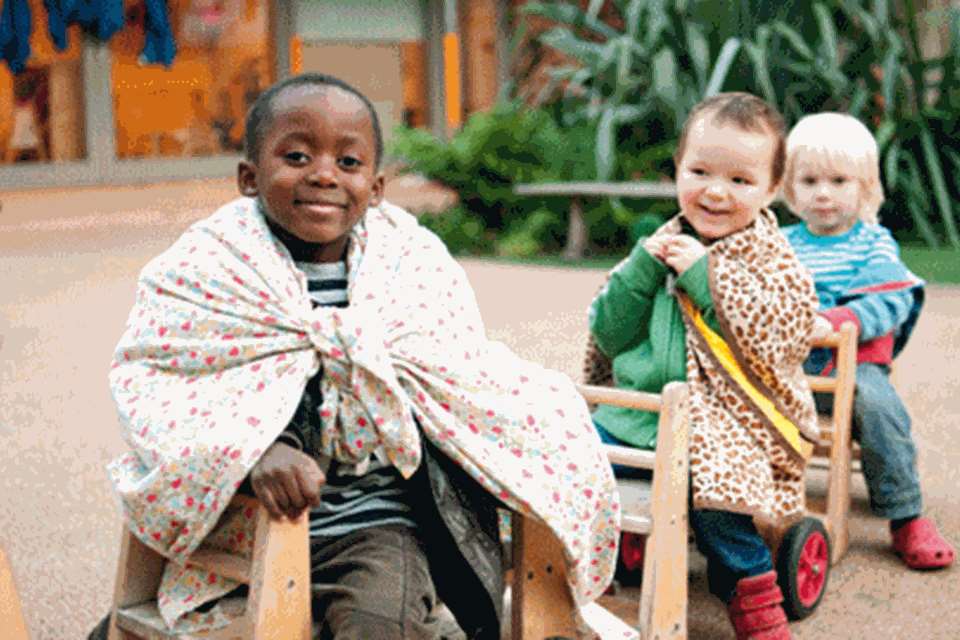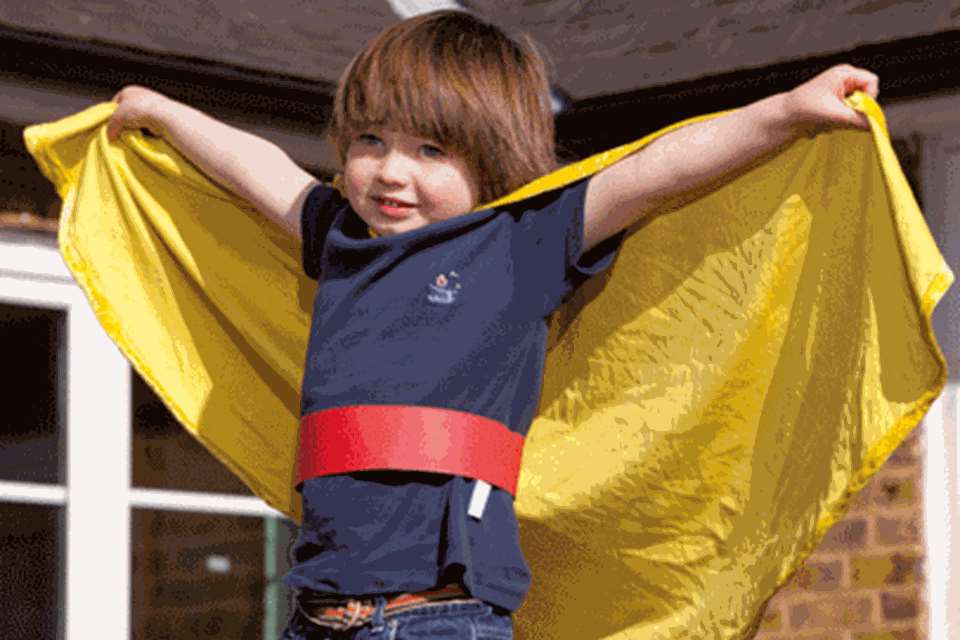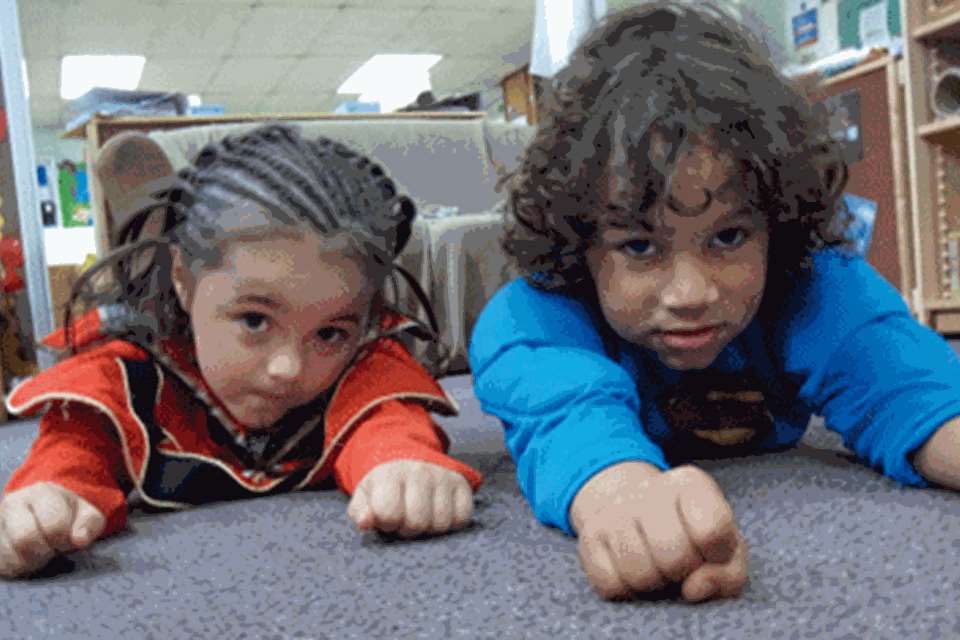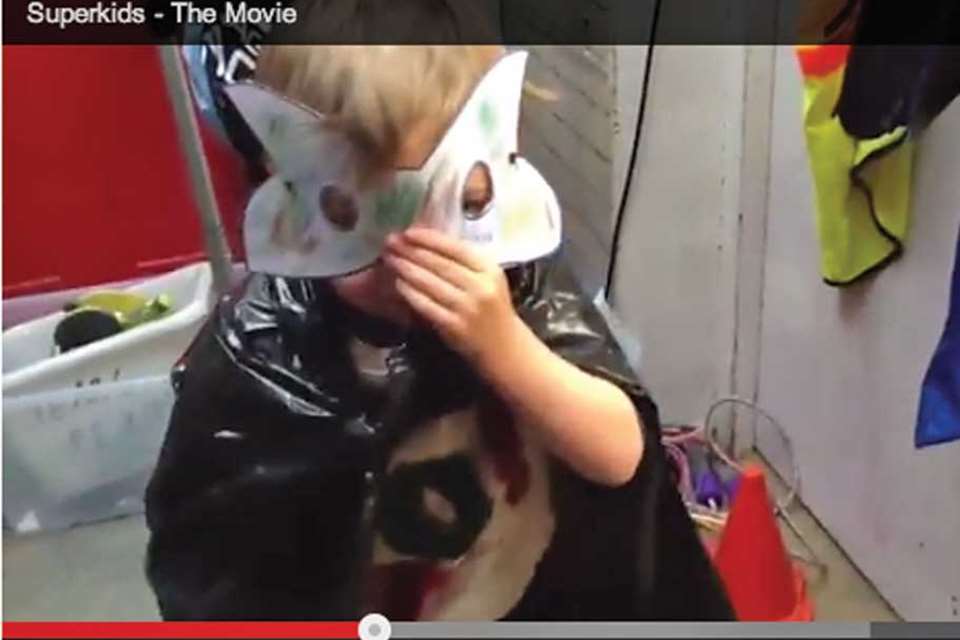Enabling Environments: Let's explore ... bad guys
Marianne Sargent
Monday, May 18, 2015
Rather than condemning weapon play, we can benefit by using children's interest in this area as a gateway for learning. Marianne Sargent advises.

It would be highly unusual for an early years setting to have weapons in their stock of toys. However, it is not unusual to find young boys creating their own guns from almost anything they can get their hands on and brandishing them as they chase each other and hide around corners in pursuit of 'bad guys'.
This can be a contentious issue in the Foundation Stage. Practitioners may find themselves feeling uncomfortable allowing children to play with weapons and pretend to kill others, while at the same time understanding their need to re-enact and process the images they see in the media, comics, television programmes and films.
Recently I have been reflecting on how I have dealt with war, weapon and superhero play both at home with my son and as a Reception class teacher. It has not only led me to consider the merits of such play, but to think more carefully about how to support, develop and extend it.
This article looks at how we might capitalise on this fascination so many boys have and use it as a gateway to learning - rather than condemning weapon play and suppressing children's interests.
ROLE PLAY
Crime and punishment
- Discuss alternatives to killing the bad guys. What would happen in real life? Do we just go around killing people who commit crimes?
- Set up a police station with a jail block for prisoners.
- Explore good and evil. Just because we make mistakes, does that mean we are bad people? Do superheroes always do the right thing? Is it always possible to make amends or are there some things that cannot be forgiven?
Considering others
- Give the children as much room as possible to chase each other. Encourage them to use outdoor space where there is less chance of bumping into anyone.
- Help the children to think about inventive ways to apprehend the bad guys. Can they think of any ways that do not involve physically grabbing and pulling?
- Academic Penny Holland suggests allowing practitioners to make their own decision about whether to opt in or out of the play. This is a good way of demonstrating personal choice to the children and teaching them that it is alright to say 'No, thank you' when asked if they would like to join in with a game they feel uncomfortable playing.
Fostering imagination and creative thinking
- Provide open-ended dressing-up clothes and costumes that the children can use to invent their own characters, villains and superheroes. Ask the children: if they could be a superhero in real life, what powers would they have?
- Leave large cardboard boxes in the outdoor area with craft and junk modelling materials for the children to invent and build super vehicles.
Learning opportunities
PSED: Shows sensitivity to others' needs and feelings and forms positive relationships with adults and other children.
PSED: Is confident to speak to others about own wants, interests and opinions.
PSED: Talks about their own and others' behaviour and the consequences and know that some behaviour is unacceptable.
UW: Knows that other children don't always enjoy the same things and are sensitive to this.
ART AND DESIGN
Dung blasters and slime shooters
- Provide junk modelling materials outdoors for the children to use at a moment's notice as their play and storylines develop during role play.
- Join those children who are making weapons and ask them to explain what they are doing. What are the different design features? What is the weapon used for and what does it do?
Creating characters
- Give the children wooden dolly pegs, coloured fabrics, felt pens, scissors and glue to make their own small-world superhero and villain characters.
- Cut out mask templates and provide craft materials for the children to design and make their own character masks.
Learning opportunities
CL: Develops own narratives and explanations by connecting ideas.
EAD: Safely uses and explores a variety of materials, tools and techniques, experimenting with colour, design, form and function.
LITERACY
Early reading
- Make phonics cards featuring superheroes and villains for reluctant readers. Find images of Joker, Penguin, Hulk, Catwoman, Batman and Storm, for example. Paste these images alongside the initial sound and print off as a set of cards.
- Create your own early reading books using illustrations from comic strips with carefully written captions and sentences tailored to individual children's reading levels and needs.
Composing storylines
- Source illustrations of different superheroes in peril. Show them to the children and ask them what they think has happened, why it has happened and what might happen next.
- Set up a small-world superhero scenario and bring the children to it to create a narrative, while you scribe for them.
- Use Lego to create stop-motion animation superhero stories. The Lego Movie Maker app from iTunes is simple to use and can be used with both iPhone and iPad (https://itunes.apple.com/gb/app/lego-movie-maker/id516001587?mt=8).
- Ask the children 'What if?', observe their play, join in and ask them to think of alternative possibilities.
Learning opportunities
L: Uses phonic knowledge to decode regular words and read them aloud accurately; also reads some common irregular words.
CL: Builds stories around toys; introduces a storyline or narrative to their play.
UW: Interacts with age-appropriate computer software.
UNDERSTANDING THE WORLD
Life and death
- Allow the children to explore what happens in real-life combat situations during their play.
Be prepared to discuss news stories and be ready to explain what happens when someone is injured and dies.
- Set up a role-play emergency response unit with an ambulance, medical kit and paramedic uniforms.
- Share books such as A Child's Garden by Michael Foreman to help the children begin to understand the consequences of war.
- Provide toy soldiers for children to try to make sense of news stories about war by re-enacting it through play.
Learning opportunities
UW: Talks about why things happen and how things work; shows care and concern for living things.
CL: Answers 'how' and 'why' questions about their experiences and in response to stories or events.
RHYMES
Five Tall Soldiers
Five tall soldiers standing in a line,
Waiting for their orders one at a time.
Along came the captain and sounding very stern,
Said to the first soldier, 'When will you learn?'
He sent him to the barracks to polish his shoes,
Leaving four tall soldiers wondering what to do.
Continue with four tall soldiers ...
See also the work of Priscilla Lamont, who has written two Nursery Rhyme Crimes books (Frances Lincoln).
Tom! Tom! (The Piper's Son) is told from the perspective of the pig, and Little Bo Peep is told from the perspective of the sheep.
GAMES
- Rhyme Robber by Orchard Toys (www.orchardtoys.com).
- Cops and robbers. Try playing this as an alternative to cat and mouse. Arrange the children in a circle holding hands. Place one child in the centre of the circle as a robber and one outside the circle as a cop. The cop must get into the circle through the children's moving arms to apprehend the robber.
RESOURCES
Come Alive Superheroes resource pack (www.yellow-door.net).
Superhero figures, wooden characters, puppets and dress-up sets (www.tts-group.co.uk).
Police uniforms, police and prisoner characters and ride-in vehicle (www.hope-education.co.uk).
Imynda Leikur and Andy Leikur Creative Play Costumes (www.fafuplay.com).
Toy Army Troopers (www.ocado.com).
Lego superhero CGI and stop-motion animations (www.lego.com).
Dolly pegs (www.hope-education.co.uk).
Printable police station role-play resources and robber-themed numbers, phonics and keyword cards (www.twinkl.com).
BOOKS
Eliot Jones, Midnight Superhero by Anne Cottringer and Alex T Smith - the story of Eliot, a quiet little boy by day but a superhero by night.
Superkid by Claire Freedman and Sarah McIntyre - a picture book about the potential of every child to be a hero.
Manfred the Baddie by John Fardell - Manfred will go to any lengths to pull off a heist, but falls ill and realises how few friends he has.
Shifty McGifty and Slippery Sam by Tracey Corderoy and Steven Lenton - a couple of robbers decide on a change of career.
A Child's Garden: a story of hope by Michael Foreman - the story of a young boy's experience of war.
The King of Space by Jonny Duddle - little boy Rex creates an army of warbots to conquer the universe.
The Wolf's Story by Toby Forward and Izhar Cohen - Little Red Riding Hood from the villain's perspective.
Superhero by Marc Tauss - superhero Maleek and his robot travel to the past to get what he needs to recreate the city.
For other ideas, visit www.richlandlibrary.com/kids/books-about-superheroes-part-1
MORE INFORMATION
'All about ... superhero play' by Nicole Weinstein, www.nurseryworld.co.uk/nursery-world/feature/1096529/eyfs-practice-about-superhero-play
Boys and Girls: superheroes in the doll corner by Vivian Gussin Paley (1984), University of Chicago Press
Rethinking Superhero and Weapon Play by Steven Popper (2013), OUP
We Don't Play With Guns Here: war, weapon and superhero play in the early years by Penny Holland (2003), OUP.
Marianne Sargent is a writer specialising in early years education and a former Foundation Stage teacher and primary and early years lecturer
[asset_library_tag 766,Download the PDF]










